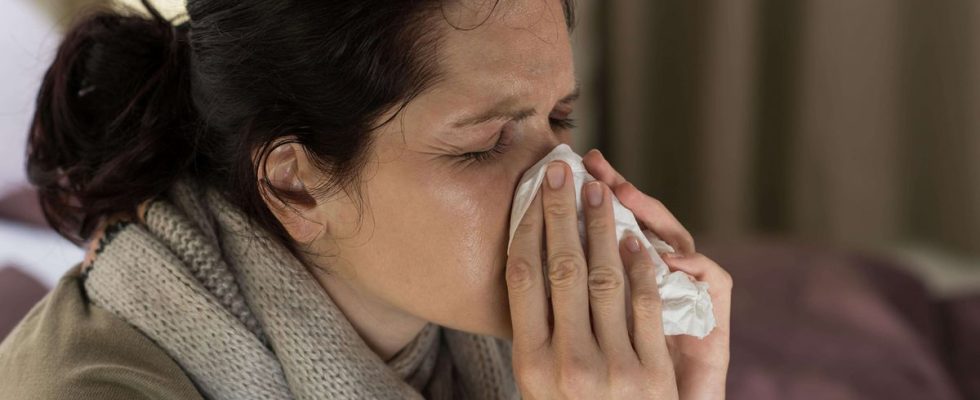Do you swallow them every time a bad cold blocks your nose? From now on, we will have to avoid it, and it is the National Medicines Safety Agency (ANSM) which says so. Decongestant medications against colds, the value of which has been contested for years because of their risk of serious side effects (stroke, heart attack, etc.), must simply be put aside, the Commission said a few days ago. the drug agency, which had not yet positioned itself so frankly. “In the event of a cold, avoid oral vasoconstrictor medications,” insisted the ANSM, listing the main treatments concerned: Actifed Rhume, Dolirhume, Humex Rhume, Nurofen Rhume and Rhinadvil Rhume.
So for the most distressing symptoms, what should you do? A few natural products from our cupboards can soothe a sore throat and decongest a blocked nose.
Inhalations and nasal cleansing
It’s indisputable: if you have a cold, you have to wait for it to pass. But when you have a blocked nose to the point of feeling like a watermelon and having trouble breathing at night, this little virus quickly becomes bothersome.
“The first instinct is to clean your nose,” advises Gilles Bonnefond, community pharmacist and founding member of the Union of Community Pharmacists’ Unions (USPO). We blow our nose, then wash our nose with physiological serum, a method that parents know well for cleaning babies’ noses. Adults use it a little less even though it is very practical for prevention and treatment. The best are seawater-based sprays, to be sprayed two to three times a day. This helps clear mucus, allows you to breathe better and avoid secondary infections.”
Then, “we can do wet inhalations with mixtures of plants,” continues the pharmacist. Better to do them in the evening, preferably with an inhaler and not with a bowl and towel. But not before going out, because the nasal mucous membranes are well dilated by the heat, and more permeable to infections,” he explains. Among the essential oils of plants and herbs recommended, tea tree, peppermint or radiant eucalyptus and ravintsara are the most indicated. If you are starting inhalations for the first time, it is recommended to opt for organic essential oils, and to seek advice from your doctor or pharmacist for safe use.
Furthermore, the ANSM reminds that you can feel better by sleeping with your head elevated.
Relieve a sore throat
While there are grandmother’s remedies for just about everything, some are effective in relieving sore throats. Julie, who returned from vacation with her in-laws “where everyone was coughing on each other”, did not take long to develop the symptoms of nasopharyngitis or angina: blocked nose, headaches, and above all, “scratchy throat, with painful swallowing and sensation of having razor blades in the back of the throat.” Although she has avoided anti-cold medications for many years, “with everything we hear,” she sought to relieve her sore throat with natural methods.
Among them, the young woman opted for “thyme herbal teas, with antiseptic and anti-inflammatory properties. The taste is not great, but with honey, which also has antimicrobial properties, it relieves a sore throat a little.” On the other hand, if Julie drinks several cups a day of this beverage when she catches a cold or a related virus, “this does not prevent it from falling into my bronchi after a few days, and afterwards I have a long cough “.
Tired, she tried another remedy to prevent the cough from taking hold: “gargling with salt water”, as recommended by Health Insurance in cases of angina. “Three times a day I boil water; in a cup I put salt and a little baking soda, then water. I let it cool and when it is lukewarm, I gargle and spit it out, several times in a row. It’s not very pleasant to the taste, you can feel the salt in your mouth, but I started several days ago, and so far, no cough to report. I will continue as long as my throat is sore when I wake up, and if I get through it without coughing, I will adopt this reflex every time! “.
Another “preventive” reflex when viruses are circulating, recalls Gilles Bonnefond, barrier gestures: hand hygiene and masks in public.

